Cambridge Science Park
The Cambridge Science Park, founded by Trinity College in 1970,[2] is the oldest science park in the United Kingdom. It is a concentration of science and technology related businesses, and has strong links with the nearby University of Cambridge.
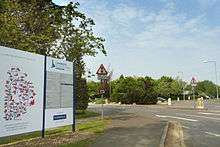 The main entrance to Cambridge Science Park | |
| Location | Milton, Cambridge |
|---|---|
| Address | Milton Road |
| Coordinates | 52°14′2″N 0°8′40″E |
| Opening date | Autumn 1973[1] |
| Developer | Bidwells[1] |
| Manager | Jeanette Walker[1] |
| Owner | Trinity College, Cambridge, Trinity Hall, Cambridge[1] |
| No. of tenants | 90[1] |
| Size | 173 acres[1] |
| Website | www.cambridgesciencepark.co.uk |
The science park is situated about 3 km to the north of Cambridge city centre, by junction 33 of the A14, in the parish of Milton, contiguous with Cambridge itself. The park is served by Cambridge North railway station and by the Cambridgeshire Guided Busway, and will also have a light railway station at its northern entrance for the planned Cambridge Autonomous Metro. It is directly adjacent to St John's Innovation Centre and Cambridge Business Park.[3]
History
The land was originally given to Trinity College when the latter was founded by Henry VIII in 1546. The land was used for farming until the Second World War, when it was requisitioned by the US Army and used to prepare vehicles and tanks for D-Day. After the war, the land was left derelict until 1970, when, at the suggestion of Tony Cornell,[4] and under the supervision of Sir John Bradfield, the college worked with Sir Francis Pemberton of Bidwells[5] to develop it into a new centre for scientific enterprise and innovation.
In 2017, following decades of rapid expansion in Cambridge, the park appointed its first director and announced a large investment intended to improve facilities and reduce traffic congestion.[1]
Notable companies
Bio-medical
Computer/telecoms
Industrial technology
Other
- Cambridge Assessment
- Cambridge Consultants
- Grant Thornton LLP
- Signal Processors Ltd
- Worldpay
Cambridge Fun Run
The Cambridge Fun Run is a charity race for Children in Need organised and mainly entered by employees of businesses based in and around the Science Park. It has been held each November since 1989. Contestants compete in teams of four, some in fancy dress, running either one lap (as a group) or four laps (as a relay) of the 1.8 km (1.1 mi) Science Park ring road. The race begins and ends, and medals and trophies are awarded (for fastest runners and best costumes) in front of the Cambridge Consultants building.[6][7]
Gallery
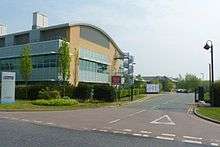 The rear entrance
The rear entrance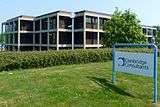 The Cambridge Consultants building
The Cambridge Consultants building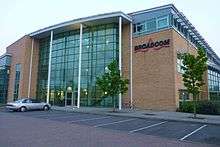 The Broadcom building
The Broadcom building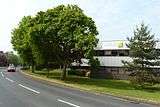 The Innovation Centre
The Innovation Centre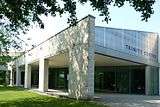 The Trinity Centre entrance
The Trinity Centre entrance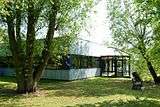 The health and fitness club
The health and fitness club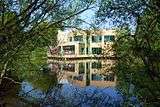 The 2wenty4 restaurant overlooking the south pond
The 2wenty4 restaurant overlooking the south pond The northeast pond
The northeast pond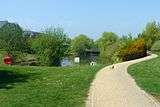 The northwest pond
The northwest pond
Notes
- "'We want to inject more soul into the Science Park', says inaugural director". 3 September 2017. Retrieved 27 January 2018.
- #BPGCSE
- Cambridge Metro
- "Ghostbuster who had the spirit to persevere". Cambridge Evening News. 16 April 2010. Archived from the original on 22 March 2012. Retrieved 24 April 2010.
- "'Great man' Sir Francis dies at 95". Cambridge Evening News. 6 November 2011. Archived from the original on 1 February 2014. Retrieved 21 January 2014.
- Cambridge Fun Run in aid of Children in Need Archived 21 November 2011 at the Wayback Machine
- GALLERY: 600 workers pass the baton for Children in Need Archived 20 November 2011 at the Wayback Machine
References
- Bowen, Ann; Pallister, John (2002). Understanding GCSE Geography. Heinemann Educational. p. 182.
External links
| Wikimedia Commons has media related to Cambridge Science Park. |